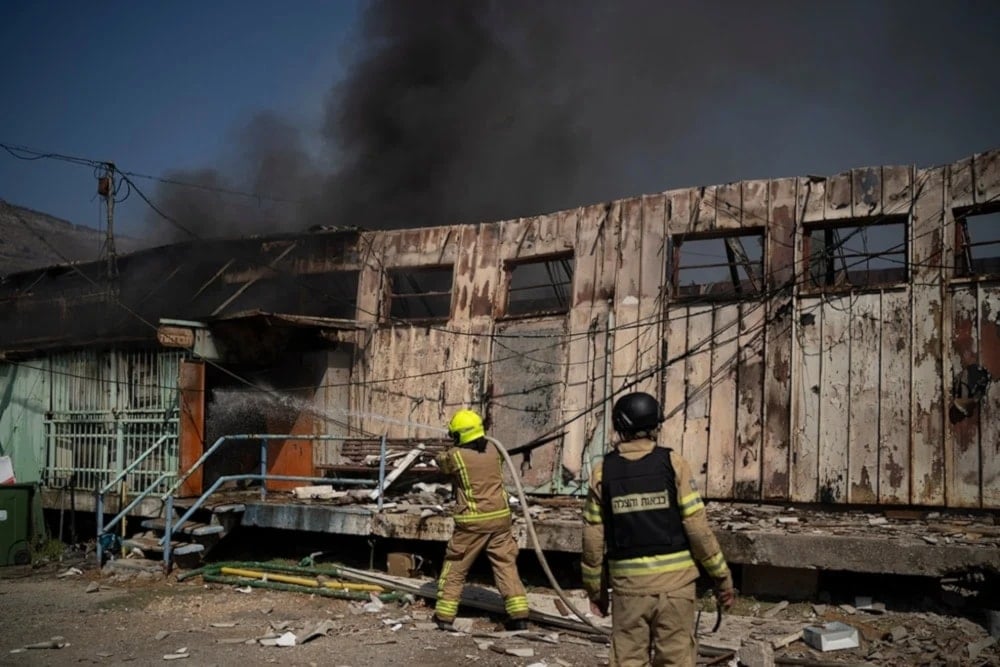Damages in northern settlements surpass $1.3 billion: Israeli media
The extensive damage encompasses thousands of settler housing units, many of which have suffered severe destruction as a result of Hezbollah's military fire.
-

Firefighters work to extinguish a fire after a rocket, fired from Lebanon, hit a local municipality storage in Kiryat Shmona, northern Palestine, September 24, 2024. (AP)
Israeli media reports indicate that the total damages in northern settlements have surpassed 5 billion shekels, equivalent to more than $1.3 billion.
Channel 12 reported that the destruction in these areas affected 2,585 residences, with 1,000 settler housing units sustaining significant damage due to Hezbollah's fire from Lebanon.
In Kiryat Shmona, more than 300 homes were damaged, with 64 of them experiencing severe destruction.
Meanwhile, Shlomi reported 360 housing units damaged, while Metulla experienced major damage to 150 units and minor damage to 250 others. In Nahariya, 190 housing units were affected, with 48 suffering severe damage.
Overwhelming majority of Israelis say return to north impossible: INSS
82.5% of Israelis believe that the current security situation prevents the return of settlers to northern occupied Palestine, the Israeli Institute for National Strategic Studies (INSS) revealed last Tuesday.
Additionally, 45% believe that "Israel" should strongly work toward reaching a ceasefire deal with Lebanon to guarantee the occupation's security needs. Meanwhile, 24% of Israelis have contemplated moving abroad, while only 29% said that they would encourage their children to enlist in the Israeli occupation forces.
Regarding the ceasefire, 86% doubt that Russia would consider "Israel's" security interests if it played a vital role in establishing an agreement with Lebanon.
In this context, Moshe Davidovich, head of the Front Line Settlements Forum in northern occupied Palestine, previously described "a bizarre state of calm mixed with extreme panic" caused by the intensity of rocket and drone attacks from Lebanon over the past three days.
Davidovich told "Israel's" Channel 12 that this morning "began with a drone attack, and this has now become routine," noting that "as the days go by, Hezbollah's pressure continues to intensify."
He continued, "We want to bring the settlers back to the north, but calm must be restored first, which has not happened yet and is still a long way off," adding that "the situation remains very sensitive, with tensions running extremely high."
Economy plunges in Shlomi, Kiryat Shmona
In terms of economy, Israeli Channel 7 has recently reported that expenditures in two evacuated northern settlements, Kiryat Shmona and Shlomi, "declined in October 2024 compared to the first month of the war last year," according to data provided by the Shva company.
Over September and October 2024, alongside the escalation of the war and the expansion of rocket range from Lebanon, a noticeable decrease in credit card purchases was observed in other northern settlements. Declines were recorded in Tabarayya, Akka, Safad, and Krayot, the channel stated.
Tali Hollenberg, Vice President of Marketing, Business Development, and Sales at Shva, said, "In the geographic breakdown of credit card spending in the first ten months of 2024, it is evident that the settlements evacuated in the north, specifically Shlomi and Kiryat Shmona, are experiencing the most dramatic decline in commercial activity."
"Israel" is suffering significant losses across the occupied north, especially as Hezbollah expands its scope of fire and intensifies its operations, reaching Haifa and beyond. Agriculture, trade, and tourism have seen major setbacks.
The Mayor of Haifa, Yona Yahav, confirmed that the city has suffered an unprecedented economic blow, stating, "Everything has come to a standstill; the streets are empty, and the shops are closed."
In statements to the Israeli military, Yahav warned that if Haifa's economy is undermined, it will impact all of "Israel", stressing that "Israel will only be strong if the North is strong."
The Israeli newspaper Yedioth Ahronoth reported that over 80% of small business owners in the eastern al-Jalil and the Golan Heights have experienced a decline in income since the war began, with half of them facing reductions of more than 65%.

 4 Min Read
4 Min Read








